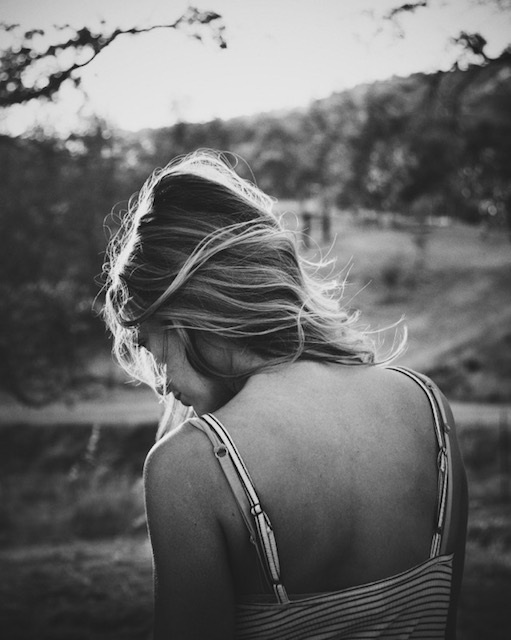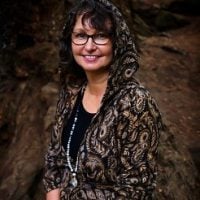
“A warrior accepts that we can never know what will happen to us next. We can try to control the uncontrollable by looking for security and predictability, always hoping for the comfortable and safe. But the truth is that we can never avoid uncertainty.” ~ Pema Chödrön
~
I used to wonder whether anyone ever actually had a pleasant childhood, and a life not marred by trauma.
I wanted to imagine that “the norm” was a bucolic, blessed existence, where children were nurtured and loved into adulthood. I imagined a childhood in which someone was surrounded by wise tribe members who understood the importance of a safe and uplifting environment.
How often do we hear each other say, “It would have been nice to have had a normal upbringing”?
Normal is the totality of human experience; it does not mean “good.” I have learned to not idealize “normal.”
The truth is that emotional wounding is something that happens to all of us in varying degrees—even those of us who did have lovely childhoods.
Being wounded is a part of living as an incarnated spirit. That’s not a statement of pessimism—it’s a clear understanding of the human condition. And as always, I write from my own experience and accumulated understanding of what that has been, sharing from my own vulnerability so that others can be comfortable in theirs.
I like this quote from Pema Chödrön that teaches about life being both gloriousness and wretchedness, and how life can both inspire us and soften us—and through pain, teach us compassion for ourselves and for others:
“Life is glorious, but life is also wretched. It is both. Appreciating the gloriousness inspires us, encourages us, cheers us up, gives us a bigger perspective, energizes us. But if that’s all that’s happening, we get arrogant and start to look down on others, and there is a sense of making ourselves a big deal and being really serious about it, wanting it to be like that forever. The gloriousness becomes tinged by craving and addiction.
On the other hand, wretchedness—life’s painful aspect—softens us up considerably. Knowing pain is a very important ingredient in being there for another person. The wretchedness humbles and softens us, but if we were only wretched, we would all just go down the tubes. We’d be so depressed, discouraged, and hopeless that we wouldn’t have the energy to eat an apple. One inspires us, the other softens us.”
What I encounter most from clients who write to me about trauma is the word “broken.” Broken is how society describes those who endure continued suffering due to life trauma. I strongly dislike the word (and concept) because it continues to damage us long after we’ve lived through our challenges.
You are not broken. You are a multidimensional being who is experiencing life in its beauty, its ugliness and its complexity. Consider removing the word from your vocabulary.
I once had a discussion with a woman who’d helped facilitate a past life regression for me, about why she no longer took people through their birth experiences as part of healing work.
For the spirit who is being incarnated, birthing is the first difficult and traumatic journey we must take. It is a complete departure from the numinous when a veil is dropped over the third eye, and we begin to navigate a series of lessons until we enter the spirit world again and see clearly.
When I understood that, I was able to let go of my idea that I was somehow special because of my emotional wounding through childhood. I allowed myself the grace of not identifying with my suffering as separating me from those who had not suffered. It was a breakthrough moment for me.
That conversation helped me to heal the part of me that wished I had been one of those “lucky” humans who were not wounded by life. From then on, I saw myself as fortunate to have this wondrous journey, no matter what it contained.
I was a spirit having a human experience, as well as a human having a spiritual experience—and whatever pain I collected on my path was a lesson in objectivity and opportunity.
It is difficult to always be objective about pain and trauma, but my choices were laid out before me. I could layer my pain into a pile of grievances, or I could choose the miracle.
That’s not to say that we should not appreciate the effort and determination it takes to find our center after abuse; but we are free from identifying as “broken” when we choose the miracle.
“Every decision I make is a choice between a grievance and a miracle. I let go of grievances and choose miracles.” ~ Deepak Chopra, Heart Sutra Meditation
What I lived through as a child and young adult gave me an opportunity to step back and value my struggle, value my healing work and value the fact that I’m connected to every other human being via my vulnerability.
I am humbled to be part of the tribe who all have, in varying degrees, lived through an often confusing but enriching life on earth. When I stopped categorizing myself as part of the wounded, I could breathe air into my experiences.
It is not my place, or anyone else’s, to tell someone when to heal or how to feel. However, we may share with each other ways to transform pain into wisdom.
It is how we see our pain and experiences, and how we identify with them, that either frees us or imprisons us. I found that as long as I waved my trauma flag, I was in constant conflict with my experience. For me, laying that flag down was freedom.
In a previous article I wrote on releasing pain and guilt surrounding abuse, I outlined five steps toward embracing trauma as part of the human condition and surrendering to the wisdom of it all. They are:
>> To fall into the pain without judgement
>> To accept it
>> To practice non-attachment
>> To make a decision about what we want to do with it
>> To nourish our souls
Soul nourishment is so important. We can do a lot of talking about trauma and suffering, but the best way I know to return to a state of wholeness is to feed ourselves with what we inherently are—spirit. That is found in different ways for us, but common themes for healing are found within nature, art, music, contact with animals or even contact with other humans, especially babies and young people.
The more we connect with our divinity, the less we are connected with trauma. We are always on this journey back to where we came from, and all encounters with spirit are healing. That is why we fall into a state of no thought when we are enjoying nature, or our pet, or a piece of music that moves us. We are literally returning home. Meditation and a yoga practice have the same effect—less thoughts and more prana, the breath of life.
I encourage you to let go. I don’t mean let go in a way that you don’t allow space for processing your trauma or pain, but to let go in the way that you can see yourself as part of the collective and not place yourself into a group of “those who are broken by pain.”
“Surrender comes when you no longer ask, ‘Why is this happening to me?’ Acceptance of the unacceptable is the greatest source of grace in this world.” ~ Ekharte Tolle
We are each other’s teachers and each other’s healing balm.
Pema Chödrön also teaches that we do not have to change ourselves; we can simply practice maitri, loving kindness. She advises that we should be kind to ourselves, and befriend ourselves, without trying to throw anything away.
So instead of throwing away our experience of suffering, we can be friends with it, and see it for what it is. Then we can become curious about it and learn from it.
I believe that emotional trauma can be transformed into wisdom as we become the observer instead of the sufferer, and we identify more with the journey than the wounds.
I welcome your thoughts about this, and invite you to share your own experience.
~
Author: Monika Carless
Image: Unsplash/Grant Porter
Editor: Yoli Ramazzina


 Share on bsky
Share on bsky




Read 1 comment and reply